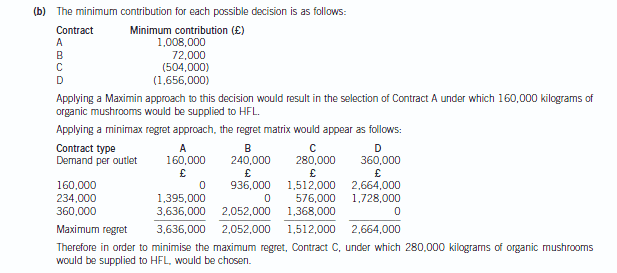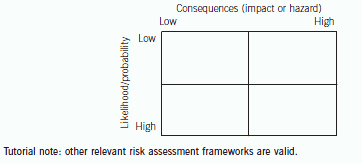速度看看!报名ACCA考试需要英语基础吗?
发布时间:2020-04-07
关于报名ACCA考试需要英语基础吗?很多小伙伴都还不是很了解,今天51题库考试学习网就带大家一起来看看吧!
ACCA是国际注册会计师的简称,在国际化趋势的大环境下,以国际会计准则为基础的ACCA资格证书,成为越来越多的财会人士的理想选择。但是ACCA毕竟是一个全球通用的一大证书,尤其在语言方面。那么,ACCA对考试语言有哪些要求?必须精通英语吗?英语水平比较低的人可以不可以报考ACCA呢?
首先,ACCA全球各国家和地区都采用了英语考试,必须在英语环境中进行考试和答题。不过,ACCA对报考ACCA专业资格考试的人员的英语水平没有硬性要求,即不要求提供英语水平证书,只要申请人认为自己的英语水平可以胜任ACCA的考试就可以。
ACCA考试报名条件:
1、教育部认可的高等院校在校生,顺利完成大一的课程考试,即可报名成为ACCA的正式学员;
2、凡具有教育部承认的大专以上学历,即可报名成为ACCA的正式学员;
3、未符合1、2项报名资格的申请者,可以先申请参加FIA基础财务资格考试。在完成FAB、FMA、FFA3门课程后,可以免考ACCA AB-MA-FA三门课程的考试,直接进入ACCA技能课程的考试。
会计ACCA的就业前景: 从个人职业发展来说,ACCA属于宏观统筹型人才。
相对于传统会计,ACCA更偏重于管理以及统筹、预测及规划企业走向及企业未来发展。这对于中国传统的应试教育来说是个非常好的互补,在获取知识用以解决实际问题这方面对于传统教学教育出来的学生是一次拓展思维训练的机会。调查中发现,在招聘网站中,大部分要求具有ACCA资格的职位有财务总监、总经理助理、董事长助理以及首席财务官。这些职位要求应聘者不仅需要计算财务方面的专业知识,还需要有对于财务分析、部门配合、以及做出专业的报告让非财务人员理解并执行的能力。且多数外企要求CFO需具备中英文两种语言能力,这对于中国学生来说也是极大的优势。
以上就是51题库考试学习网带来的全部内容了,如果想要了解更多关于考试的信息,大家可以关注51题库考试学习网哦,51题库考试学习网每天会为大家更新考试相关的内容。
下面小编为大家准备了 ACCA考试 的相关考题,供大家学习参考。
(b) Determine whether your decision in (a) would change if you were to use each of the Maximin and Minimax
regret decision criteria.
Your answer should be supported by relevant workings. (6 marks)

(c) Explain the extent to which you should plan to place reliance on analytical procedures as audit evidence.
(6 marks)
(c) Extent of reliance on analytical procedures as audit evidence
Tutorial note: In the requirement ‘… reliance … as audit evidence’ is a direction to consider only substantive analytical
procedures. Answer points concerning planning and review stages were not asked for and earn no marks.
■ Although there is likely to be less reliance on analytical procedures than if this had been an existing audit client, the fact
that this is a new assignment does not preclude placing some reliance on such procedures.
■ Analytical procedures will not be relied on in respect of material items that require 100% testing. For example, additions
to property is likely to represent a very small number of transactions.
■ Analytical procedures alone may provide sufficient audit evidence on line items that are not individually material. For
example, inventory (less than 1/2% revenue and less than 1% total assets) may be shown to be materially correctly
stated through analytical procedures on consumable stores (i.e. fuel, lubricants, materials for servicing vehicles etc).
■ Substantive analytical procedures are best suited to large volume transactions (e.g. revenue, materials expense, staff
costs). If controls over the completeness, accuracy and validity of recording transactions in these areas are effective then
substantive analytical procedures showing that there are no unexpected fluctuations should reduce the need for
substantive detailed tests.
■ The extent of planned use will be dependent on the relationships expected between variables. (e.g. between items of
financial information and between items of financial and non-financial information). For example, if material costs rise
due to an increase in the level of business then a commensurate increase in revenue and staff costs might be expected
also.
■ ‘Proofs in total’ (or reasonableness tests) provide substantive evidence that income statement items are not materially
misstated. In the case of Yates these might be applied to staff costs (number of employees in each category ×
wage/salary rates, grossed up for social security, etc) and finance expense (interest rate × average monthly overdraft
balance).
■ However, such tests may have limited application, if any, if the population is not homogenous and cannot be subdivided.
For example, all the categories of non-current asset have a wide range of useful life. Therefore it would be
difficult/meaningless to apply an ‘average’ depreciation rate to all assets in the class to substantiate the total depreciation
expense for the year. (Although it might highlight a risk of potential over or understatement requiring further
investigation.)
■ Substantive analytical procedures are more likely to be used if there is relevant information available that is being used
by Yates. For example, as fuel costs will be significant, Yates may monitor consumption (e.g. miles per gallon (MPG)).
■ Analytical procedures may supplement alternative procedures that provide evidence regarding the same assertion. For
example, the review of after-date payments to confirm the completeness of trade payables may be supplemented by
calculations of average payment period on a monthly basis.
Tutorial note: Credit will be given for other relevant points drawn from the scenario. For example, the restructuring during
the previous year is likely to have caused fluctuations that may result in less reliance being placed on analytical procedures.
(b) Describe a framework to assess the risks to the progress of the Giant Dam Project. Your answer should
include a diagram to represent the framework. (6 marks)
(b) Framework for assessing risk
Risk is assessed by considering each identified risk in terms of two variables:
– its hazard (or consequences or impact) and,
– its probability of happening (or being realised or ‘crystallising’).
The most material risks are those identified as having high impact/hazard and the highest probability of happening. Risks
with low hazard and low probability will have low priority whilst between these two extremes are situations where judgement
is required on how to manage the risk.
In practice, it is difficult to measure both variables with any degree of certainty and so if is often sufficient to consider each
in terms of relative crude metrics such as ‘high/medium/low’ or even ‘high/low’. The framework can be represented as a ‘map’
of two intersecting continuums with each variable being plotted along a continuum.

声明:本文内容由互联网用户自发贡献自行上传,本网站不拥有所有权,未作人工编辑处理,也不承担相关法律责任。如果您发现有涉嫌版权的内容,欢迎发送邮件至:contact@51tk.com 进行举报,并提供相关证据,工作人员会在5个工作日内联系你,一经查实,本站将立刻删除涉嫌侵权内容。
- 2020-05-14
- 2020-03-20
- 2020-01-09
- 2020-01-09
- 2020-05-15
- 2020-01-09
- 2020-01-14
- 2019-07-19
- 2020-04-01
- 2020-01-09
- 2020-04-05
- 2020-01-09
- 2020-01-09
- 2020-01-01
- 2020-01-09
- 2020-01-29
- 2020-02-28
- 2020-01-31
- 2020-05-08
- 2019-12-25
- 2020-03-17
- 2020-03-30
- 2020-03-13
- 2020-05-20
- 2020-03-21
- 2020-03-14
- 2020-04-05
- 2020-01-09
- 2019-12-30
- 2020-02-19